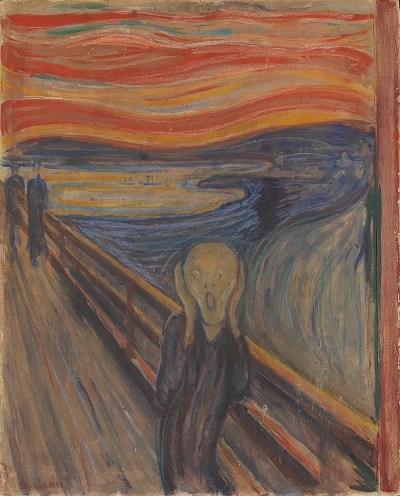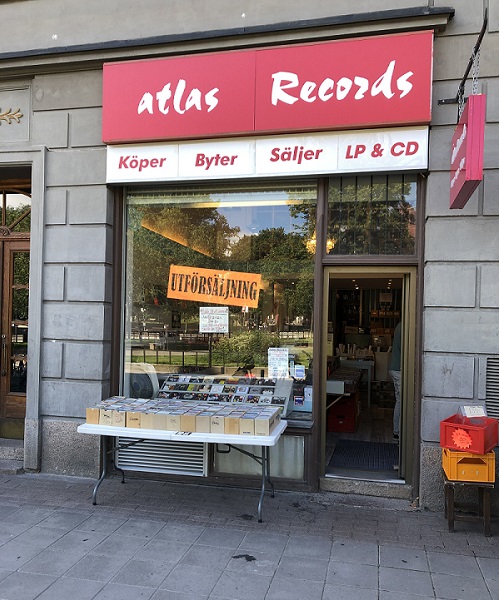 The setting: The year is 1985. A shabby, but absolute not chic, dorm in Uppsala. Known for its old university founded in 1477. Also known for its student nations, read more here (opens in a new window). A stripped dorm room equipped only with the bare essentials. There it is. A hifi system with a CD player. Needless to say, I got impressed. At the time, a CD player was nearly science fiction; a laser reading 0 and 1. This was unbelievable. No more scratches and hissing. The cd player belonged to my friend Mikael, site architect and web analysts. Back then, he used to test the patience of other students by playing "p: Machinery" by German synthpop group Propaganda on maximum volume (it was the 1980s). I wasn't ready for a cd player. I held on to my Thorens turntable. It wasn't until 1990 that I bought my first cd player. It felt 100 percent safe. I would never have to change format again. This was the future. Anyway, that's what I thought. Twelve years later, in 2002, cd sales peaked and then fell rapidly. In the Sweden cd sales literally plummeted. In fact, a decline of biblical proportions. In 2019 total cd sales revenues was only 55,6 million SEK (6,3 million dollars). CD sales fell with 27 percent compared with the previous year. CD sales was 3,5 percent of total music revenues (same as vinyl). I like cd and I'm too old to change format. Also, I'm too old for despair. I will go under with the ship. And, you will pry my cds out of my cold, dead and decomposed hands.
The setting: The year is 1985. A shabby, but absolute not chic, dorm in Uppsala. Known for its old university founded in 1477. Also known for its student nations, read more here (opens in a new window). A stripped dorm room equipped only with the bare essentials. There it is. A hifi system with a CD player. Needless to say, I got impressed. At the time, a CD player was nearly science fiction; a laser reading 0 and 1. This was unbelievable. No more scratches and hissing. The cd player belonged to my friend Mikael, site architect and web analysts. Back then, he used to test the patience of other students by playing "p: Machinery" by German synthpop group Propaganda on maximum volume (it was the 1980s). I wasn't ready for a cd player. I held on to my Thorens turntable. It wasn't until 1990 that I bought my first cd player. It felt 100 percent safe. I would never have to change format again. This was the future. Anyway, that's what I thought. Twelve years later, in 2002, cd sales peaked and then fell rapidly. In the Sweden cd sales literally plummeted. In fact, a decline of biblical proportions. In 2019 total cd sales revenues was only 55,6 million SEK (6,3 million dollars). CD sales fell with 27 percent compared with the previous year. CD sales was 3,5 percent of total music revenues (same as vinyl). I like cd and I'm too old to change format. Also, I'm too old for despair. I will go under with the ship. And, you will pry my cds out of my cold, dead and decomposed hands.
 To sing one's own praise isn't a good quality, but I think I know what I'm doing - if not professionally - then running this site. My core competence is to sniff out the best and brightest (that means darkest) artists and bands in the gothic country genre. In fact, I'm olfactive like a truffle hog. This is a nice property since you have to root around a lot to find something of value. Olfaction, or the sense of smell, is the process of creating the perception of smell. It's technical, but it boils down to a bulb. The olfactory bulb is a neural structure of the vertebrate forebrain involved in the sense of smell. It sends information to be further processed in the amygdala, the orbitofrontal cortex and the hippocampus where it plays a role in emotion, memory and learning. I can tell fragrance from stench and everything in between. However, self-glorification should always be avoided. A couple a weeks ago I climbed down from my pedestal. Maybe, there were still bands and artists out there waiting to be found? And maybe, there were bands and artists that I have overlooked. For a moment I felt open and joined a Facebook-group dedicated to my kind of music. I left the group after a short time. Disappointed, to say the least. "There is nothing for you here, only death". Well, not even death was present. Instead, I was faced with a lack of knowledge, meaning and, last but not least, taste. I felt an urge to become the administrator. Maybe then, five percent of the content would slip through my iron hand. I quickly snapped out of my openness. It feels good to be back in the role as the high priest and chief exponent of the genre. This makes me even more stubborn and unforgiven. Olfactory refractory is my diagnosis.
To sing one's own praise isn't a good quality, but I think I know what I'm doing - if not professionally - then running this site. My core competence is to sniff out the best and brightest (that means darkest) artists and bands in the gothic country genre. In fact, I'm olfactive like a truffle hog. This is a nice property since you have to root around a lot to find something of value. Olfaction, or the sense of smell, is the process of creating the perception of smell. It's technical, but it boils down to a bulb. The olfactory bulb is a neural structure of the vertebrate forebrain involved in the sense of smell. It sends information to be further processed in the amygdala, the orbitofrontal cortex and the hippocampus where it plays a role in emotion, memory and learning. I can tell fragrance from stench and everything in between. However, self-glorification should always be avoided. A couple a weeks ago I climbed down from my pedestal. Maybe, there were still bands and artists out there waiting to be found? And maybe, there were bands and artists that I have overlooked. For a moment I felt open and joined a Facebook-group dedicated to my kind of music. I left the group after a short time. Disappointed, to say the least. "There is nothing for you here, only death". Well, not even death was present. Instead, I was faced with a lack of knowledge, meaning and, last but not least, taste. I felt an urge to become the administrator. Maybe then, five percent of the content would slip through my iron hand. I quickly snapped out of my openness. It feels good to be back in the role as the high priest and chief exponent of the genre. This makes me even more stubborn and unforgiven. Olfactory refractory is my diagnosis.
 The Southern Gothic Campout 2020 wasn't pronounced dead at the scene. Just cancelled. In terms of substance, it's nearly the same thing. The cause for cancellation wasn't a potential risk of overcrowding. Too many people in the middle of nowhere in Adams, TN has never posed a problem for the arranger. The attendance figure was circa 100 in 2017 and tickets were limited to 300 in 2019. On June 26th the arranger wrote on their Facebook page: "This event has finally succumbed to the cold icy grip of the Covid-19 virus. Our 2 headliners have canceled their tours for 2020. Slim Cessna's Auto Club and Munly & The Lupercalians have pushed their performance to the 2021 Southern Gothic Campout. You may use your ticket for any other Muddy Roots event through 2022." When the headliners are gone, everything else falls apart. The SGC music festival was supposed to become a tradition this year since thrice is a tradition. Covid-19 has led to a downfall for many sectors. For musicians, however, the pandemic have had the same effect as when you put an icehockey-stick through the spokes of a bicycle. Sudden and total stop. Nobody knows if, when and how things are going to start up again. The maximum number of people allowed at a public event in Sweden is limited to 50 since March 2020. The restriction applies to events such as concerts, conferences, and sports matches, but not to private events such as parties or weddings, or in places like schools, workplaces or shopping centres. The Swedish Government declared on August 24th that the limit on public events would remain, but that it is looking into granting exceptions for seated events. The Public Health Agency of Sweden has recently suggested a limit of 500 people for seated events and 1 meter (40 inches) between attendants. This is good, but 500 people in a 3000 people venue will not make ends meet. Someone has to pay for the 2500 empty seats. Maybe, the Government has a plan. Southern Gothic Campout is a great initiative. It would be very unfortunate if the dark roots music festival never became a tradition. We need traditions. They contribute to a sense of belonging and meaningfulness. And we need to belong to something and things must have a meaning. Otherwise, we might as well be dead.
The Southern Gothic Campout 2020 wasn't pronounced dead at the scene. Just cancelled. In terms of substance, it's nearly the same thing. The cause for cancellation wasn't a potential risk of overcrowding. Too many people in the middle of nowhere in Adams, TN has never posed a problem for the arranger. The attendance figure was circa 100 in 2017 and tickets were limited to 300 in 2019. On June 26th the arranger wrote on their Facebook page: "This event has finally succumbed to the cold icy grip of the Covid-19 virus. Our 2 headliners have canceled their tours for 2020. Slim Cessna's Auto Club and Munly & The Lupercalians have pushed their performance to the 2021 Southern Gothic Campout. You may use your ticket for any other Muddy Roots event through 2022." When the headliners are gone, everything else falls apart. The SGC music festival was supposed to become a tradition this year since thrice is a tradition. Covid-19 has led to a downfall for many sectors. For musicians, however, the pandemic have had the same effect as when you put an icehockey-stick through the spokes of a bicycle. Sudden and total stop. Nobody knows if, when and how things are going to start up again. The maximum number of people allowed at a public event in Sweden is limited to 50 since March 2020. The restriction applies to events such as concerts, conferences, and sports matches, but not to private events such as parties or weddings, or in places like schools, workplaces or shopping centres. The Swedish Government declared on August 24th that the limit on public events would remain, but that it is looking into granting exceptions for seated events. The Public Health Agency of Sweden has recently suggested a limit of 500 people for seated events and 1 meter (40 inches) between attendants. This is good, but 500 people in a 3000 people venue will not make ends meet. Someone has to pay for the 2500 empty seats. Maybe, the Government has a plan. Southern Gothic Campout is a great initiative. It would be very unfortunate if the dark roots music festival never became a tradition. We need traditions. They contribute to a sense of belonging and meaningfulness. And we need to belong to something and things must have a meaning. Otherwise, we might as well be dead.
 Technical changes seems to be unstoppable whether we like it or not. I always say, progress is a fine thing, taken in moderation. Joseph Schumpeter was one of the most influential economists of the early 20th century, and popularized the term "creative destruction". According to Schumpeter it describes the "process of industrial mutation that continuously revolutionizes the economic structure from within, incessantly destroying the old one, incessantly creating a new one". Spotify is often taken as an example. They are a destroyer, that's for sure. However, I have serious doubts as to whether Spotify represents something new and lasting. Let's look at the latest figures. The financial report for Q2 2020 send shock waves. Operating loss amounted to €167 million (197 million dollar) and net loss was €356 million (421 million dollar). In any other kind of business the CFO would be out on ledge and ready to jump. Not in this case. The trademarks are headless expansion and throwing good money after bad. Some people claim that you got to spend money to make money. However, the Spotify spending reminds more of a cult sacrifice. The conversion strategy (by providing freemium, users will upgrade to premium) has been proven and failed. After more than 10 years the share of paying users is still below 50 percent. According to the Q2 report Spotify has about 138 million paying (premium) users (of a total of 299 million users) in Q2 2020, which makes 46 percent. In Q2 the number of paying users increased with 27 percent. At the same time the total number of users increased with 29 percent. Anyone can do the math: costs increases faster than revenues. However, the dancing around the golden calf will continue as long as there are investors who dream of enriching themselves. Well, dream on. In a pyramid scheme you need to be at the top of the pyramid, like the co-founder and CEO Daniel Ek. He made a comment the other day, which was very illuminating, yet unveiling. According to Daniel Ek artists will need to record an album more often than once every three or four years to make sufficient income. He obviously doesn't know anything about music or music composing. Or care, for that matter. Greed is good, said the fictive character Gordon Gekko. I don't agree. The streaming business model is built upon unfairness. Spotify stand out, by far, by paying least to artists. In my opinion, Spotify isn't part of any "creative destruction". On the contrary, they are leading in "uncreative destruction". I really hate everything about Spotify, read more here (opens in a new window). In the Q2 pressrelease Spotify turned to its shareholders with flowery words: "Our business performed well in Q2 and continues to operate at a high level despite the continuing uncertainty surrounding the COVID-19 pandemic." Yeah, right. The dog ate my homework.
Technical changes seems to be unstoppable whether we like it or not. I always say, progress is a fine thing, taken in moderation. Joseph Schumpeter was one of the most influential economists of the early 20th century, and popularized the term "creative destruction". According to Schumpeter it describes the "process of industrial mutation that continuously revolutionizes the economic structure from within, incessantly destroying the old one, incessantly creating a new one". Spotify is often taken as an example. They are a destroyer, that's for sure. However, I have serious doubts as to whether Spotify represents something new and lasting. Let's look at the latest figures. The financial report for Q2 2020 send shock waves. Operating loss amounted to €167 million (197 million dollar) and net loss was €356 million (421 million dollar). In any other kind of business the CFO would be out on ledge and ready to jump. Not in this case. The trademarks are headless expansion and throwing good money after bad. Some people claim that you got to spend money to make money. However, the Spotify spending reminds more of a cult sacrifice. The conversion strategy (by providing freemium, users will upgrade to premium) has been proven and failed. After more than 10 years the share of paying users is still below 50 percent. According to the Q2 report Spotify has about 138 million paying (premium) users (of a total of 299 million users) in Q2 2020, which makes 46 percent. In Q2 the number of paying users increased with 27 percent. At the same time the total number of users increased with 29 percent. Anyone can do the math: costs increases faster than revenues. However, the dancing around the golden calf will continue as long as there are investors who dream of enriching themselves. Well, dream on. In a pyramid scheme you need to be at the top of the pyramid, like the co-founder and CEO Daniel Ek. He made a comment the other day, which was very illuminating, yet unveiling. According to Daniel Ek artists will need to record an album more often than once every three or four years to make sufficient income. He obviously doesn't know anything about music or music composing. Or care, for that matter. Greed is good, said the fictive character Gordon Gekko. I don't agree. The streaming business model is built upon unfairness. Spotify stand out, by far, by paying least to artists. In my opinion, Spotify isn't part of any "creative destruction". On the contrary, they are leading in "uncreative destruction". I really hate everything about Spotify, read more here (opens in a new window). In the Q2 pressrelease Spotify turned to its shareholders with flowery words: "Our business performed well in Q2 and continues to operate at a high level despite the continuing uncertainty surrounding the COVID-19 pandemic." Yeah, right. The dog ate my homework.
 Atlas Shrugged. I'm sorry to disappoint you. This blog post isn't a tedious explanatory note about Ayn Rand's influential book from 1957. Instead, it deals with the closing of Atlas Records (formely known as Atlas CD-börs). The record store in Stockholm was named Atlas since it was located in the block named Atlas south of S:t Eriksplan, between S:t Eriksgatan, Torsgatan and Barnhusviken. The block got its name after an industrial and engineering company, AB Atlas, which operated there until 1927. Atlas had five different locations in the block. First location was at Atlasmuren, and then Torsgatan (two different locations). For over 15 years Atlas had a prime location at S:t Eriksgatan 78. However, a "market adjustment" put a stop to that. The owner of the premises, a housing association, raised the rent with 100 000 SEK a year (11 300 USD). They cried crocodile tears in the local paper. Atlas had on one hand been a problem-free tenant and some of the members in the housing association were customers, but on the other hand the housing association needed to act "in the interest of its members". Self-interest always takes precedence over moral considerations. The new rent was far beyond what a used record store could take. Atlas found a new home around the corner at S:t Eriksplan 5, where it remained until the end. It was only a stone's throw away, but it took some time for old and new customers to find their way there and for the store to regain its former glory. A couple of years ago I wrote a blog post about the rise and fall of record stores, read more here (opens in a new window). It has been all downhill after that. Atlas survived very hard times: illegal downloading, legal downloading, vinylmania and, last but not least, streaming. The virus covid-19 became the straw that broke the camel's back. The economic margins has always been small. You are dependent on a steady (however small) flow of customers. This Tuesday the owner Micke Bofält closed shop and retired. What made Atlas so resilient and viable? First and foremost, a knowledgeable owner and manager. Second, a store kept in an impeccable order (some adjacent cd stores give the concept of chaos a new and deeper meaning). Third, a large variety of offers. I even bought some gothic country cds there. Fourth, moderate and correct prices. Fifth and last, good customer treatment. The S:t Eriksgatan-Odengatan route was known for accommodate the highest density of record stores in Europe. This era is now long gone. The few remaining stores struggle to survive. For example, Skivbörsen has closed until further notice due to covid-19. Atlas Records was without any doubt one of top-three record stores in Stockholm. Atlas was a Titan. The closing of Atlas may not have rocked the world in its foundations, but the end of the block shrugged. The Titan Atlas was namely condemned to hold up the celestial heavens for eternity.
Atlas Shrugged. I'm sorry to disappoint you. This blog post isn't a tedious explanatory note about Ayn Rand's influential book from 1957. Instead, it deals with the closing of Atlas Records (formely known as Atlas CD-börs). The record store in Stockholm was named Atlas since it was located in the block named Atlas south of S:t Eriksplan, between S:t Eriksgatan, Torsgatan and Barnhusviken. The block got its name after an industrial and engineering company, AB Atlas, which operated there until 1927. Atlas had five different locations in the block. First location was at Atlasmuren, and then Torsgatan (two different locations). For over 15 years Atlas had a prime location at S:t Eriksgatan 78. However, a "market adjustment" put a stop to that. The owner of the premises, a housing association, raised the rent with 100 000 SEK a year (11 300 USD). They cried crocodile tears in the local paper. Atlas had on one hand been a problem-free tenant and some of the members in the housing association were customers, but on the other hand the housing association needed to act "in the interest of its members". Self-interest always takes precedence over moral considerations. The new rent was far beyond what a used record store could take. Atlas found a new home around the corner at S:t Eriksplan 5, where it remained until the end. It was only a stone's throw away, but it took some time for old and new customers to find their way there and for the store to regain its former glory. A couple of years ago I wrote a blog post about the rise and fall of record stores, read more here (opens in a new window). It has been all downhill after that. Atlas survived very hard times: illegal downloading, legal downloading, vinylmania and, last but not least, streaming. The virus covid-19 became the straw that broke the camel's back. The economic margins has always been small. You are dependent on a steady (however small) flow of customers. This Tuesday the owner Micke Bofält closed shop and retired. What made Atlas so resilient and viable? First and foremost, a knowledgeable owner and manager. Second, a store kept in an impeccable order (some adjacent cd stores give the concept of chaos a new and deeper meaning). Third, a large variety of offers. I even bought some gothic country cds there. Fourth, moderate and correct prices. Fifth and last, good customer treatment. The S:t Eriksgatan-Odengatan route was known for accommodate the highest density of record stores in Europe. This era is now long gone. The few remaining stores struggle to survive. For example, Skivbörsen has closed until further notice due to covid-19. Atlas Records was without any doubt one of top-three record stores in Stockholm. Atlas was a Titan. The closing of Atlas may not have rocked the world in its foundations, but the end of the block shrugged. The Titan Atlas was namely condemned to hold up the celestial heavens for eternity.
